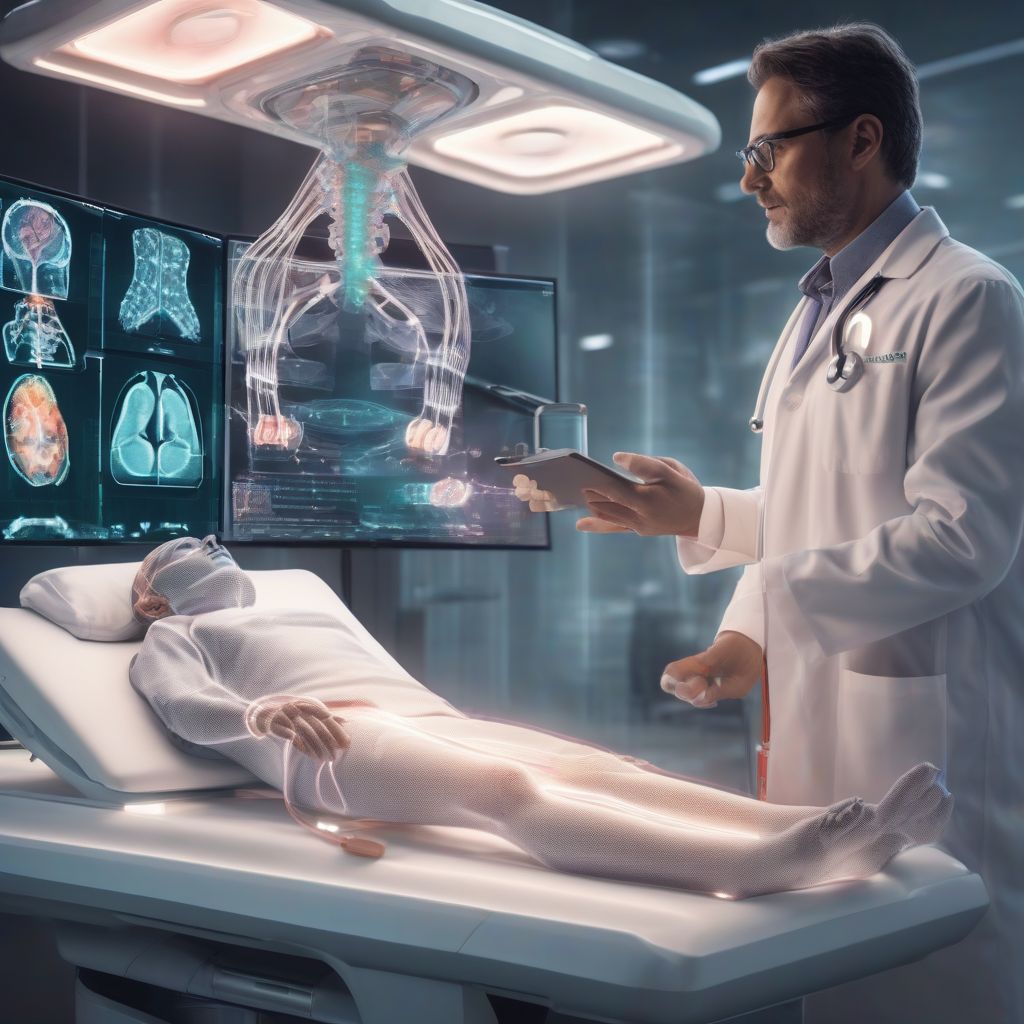Imagine a world where diagnosing diseases is faster and more accurate, where personalized treatment plans are readily available, and where robots assist surgeons with complex procedures. This is not a scene from a sci-fi movie; this is the future of healthcare, driven by the transformative power of Artificial Intelligence (AI) and Machine Learning (ML).
Understanding the Basics: AI and Machine Learning in Layman’s Terms
Before we delve into the exciting ways AI and ML are transforming healthcare, let’s demystify these terms. In simple words, AI enables computers to mimic human intelligence, while ML, a subset of AI, allows computers to learn from data without explicit programming. This means we can feed massive amounts of healthcare data into these systems, and they can identify patterns, make predictions, and even learn from their mistakes – just like our brains, but on a much larger scale!
Revolutionizing Diagnosis: Early Detection and Precision Medicine
One of the most significant impacts of AI and ML in healthcare is in the realm of diagnosis. These technologies are proving invaluable in detecting diseases at their earliest stages, sometimes even before symptoms appear. For instance, AI-powered image analysis tools can identify subtle changes in medical images like X-rays, CT scans, and MRIs, which might be missed by the human eye. This early detection is crucial for improving patient outcomes and saving lives, particularly in cases of cancer and cardiovascular diseases.
Furthermore, AI and ML are paving the way for personalized medicine. By analyzing a patient’s medical history, genetic information, and lifestyle factors, these technologies can help predict their risk for specific diseases and tailor treatment plans to their individual needs. This personalized approach can significantly improve treatment effectiveness and minimize adverse reactions.
 AI-Powered Medical Diagnosis
AI-Powered Medical Diagnosis
Enhancing Treatment and Care: From Personalized Plans to Robotic Surgery
Beyond diagnosis, AI and ML are revolutionizing various aspects of treatment and care. One such area is drug discovery and development. AI algorithms can analyze vast datasets of molecular structures and clinical trial results to identify promising drug candidates, accelerating the development of new therapies for complex diseases.
Robotic surgery is another exciting application of these technologies. AI-assisted robotic systems can perform intricate surgical procedures with incredible precision, minimizing invasiveness, reducing complications, and improving patient recovery times. This technology is particularly beneficial for minimally invasive surgeries and procedures requiring extreme accuracy.
Streamlining Healthcare Operations: Efficiency and Accessibility
The impact of AI and ML extends beyond direct patient care; these technologies are also streamlining healthcare operations, making them more efficient and accessible. For instance, AI-powered chatbots and virtual assistants can handle routine patient inquiries, schedule appointments, and provide basic health information, freeing up healthcare professionals to focus on more complex cases.
Furthermore, AI and ML can analyze large datasets to optimize hospital workflows, manage resources effectively, and predict patient admissions. This data-driven approach helps healthcare institutions improve their operations, reduce wait times, and enhance the overall patient experience.
[amazon bestseller=”Artificial Intelligence in Healthcare”]
The Future of AI and Machine Learning in Healthcare: Challenges and Opportunities
While the potential of AI and ML in healthcare is undeniable, some challenges need to be addressed. Data privacy and security are paramount concerns, as these technologies rely heavily on sensitive patient information. Ensuring the ethical use of AI, addressing potential biases in algorithms, and integrating these technologies seamlessly into existing healthcare systems are crucial steps in realizing the full potential of AI and ML in healthcare.
Despite these challenges, the future of AI and ML in healthcare is bright. As these technologies continue to evolve, we can expect to see even more groundbreaking applications emerge, further transforming the healthcare landscape and improving patient outcomes globally. From personalized medicine and early diagnosis to robotic surgery and streamlined operations, AI and ML are poised to revolutionize healthcare as we know it.
Key Takeaways: Embracing the AI-Powered Future of Healthcare
Here’s a recap of the key takeaways we’ve discussed:
- AI and ML are revolutionizing healthcare: These technologies are transforming diagnosis, treatment, and overall healthcare operations.
- Early detection and personalized medicine: AI and ML enable earlier disease detection and personalized treatment plans, leading to better patient outcomes.
- Improved treatment and care: AI is assisting in drug discovery, robotic surgery, and developing more effective therapies.
- Streamlined operations: AI and ML are making healthcare operations more efficient, accessible, and patient-centric.
- Addressing challenges is crucial: Ensuring data privacy, ethical use, and seamless integration are vital for the successful implementation of AI and ML in healthcare.
We’re on the cusp of a new era in healthcare, driven by the transformative power of AI and ML. By embracing these advancements and addressing the accompanying challenges, we can unlock a future where healthcare is more accurate, efficient, and personalized than ever before. What are your thoughts on the role of AI and ML in healthcare? Share your insights and join the conversation!
